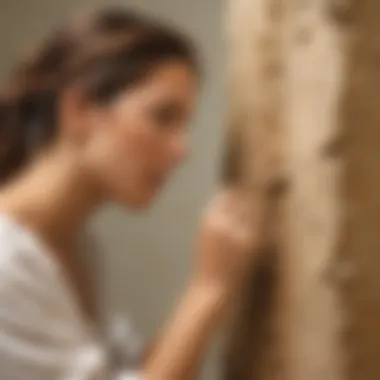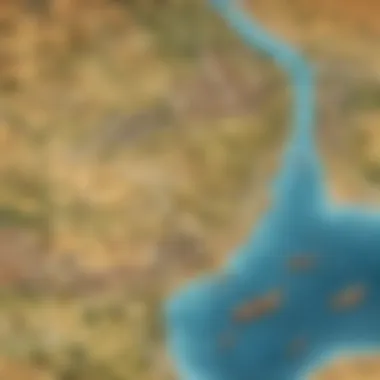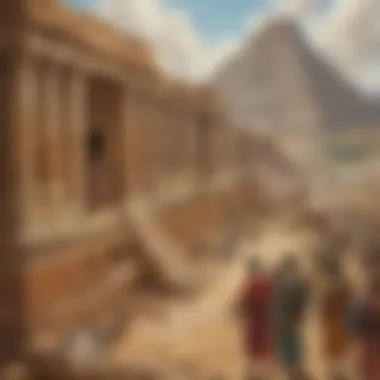Unveiling the Enigmatic Path of Becoming an Archaeologist: A Fascinating Voyage through Time


Science Fun Facts
Unlock the secrets of the past through the lens of archaeology. Did you know that ancient Egyptians believed in an afterlife and constructed elaborate tombs to ensure a smooth journey to the next world? Each artifact unearthed tells a unique story spanning centuries of human civilization. From the majestic pyramids of Giza to the epic city of Troy, archaeologists navigate a tapestry of history buried beneath the sands of time.
Discover the Wonders of Archaeology
Step into the shoes of archaeologists as they meticulously excavate hidden treasures and unravel mysteries long forgotten. Explore the delicate art of sifting through ancient relics, piecing together shards of pottery, and deciphering forgotten scripts etched into tablets. Witness the fusion of science and storytelling as each artifact unveils a fragment of the past, shedding light on lost realms and enigmatic cultures.
The Path to Becoming an Archaeologist
Embarking on a career in archaeology requires dedication, perseverance, and a passion for unraveling history's enigmas. Aspiring archaeologists delve into various disciplines such as anthropology, history, and geology to develop a holistic understanding of the past. From participating in field excavations to analyzing artifacts in labs, this journey demands both patience and precision, honing skills crucial to unraveling ancient mysteries.
Unveiling Ancient Civilizations
Venture into the realms of ancient civilizations and unearth the remnants of bygone eras. Explore the majestic grandeur of Mesopotamia, the architectural prowess of the Greeks, and the philosophical legacy of the Romans. By studying ancient societies' art, architecture, and social structures, archaeologists piece together a vivid tapestry of human history, shedding light on the triumphs and tribulations of civilizations long past.
Tools of the Trade
Equip yourself with the tools essential for archaeological exploration. From trowels for delicate excavation to brushes for meticulous cleaning, each tool plays a crucial role in preserving historical artifacts. Dive into the realm of technology with ground-penetrating radars and 3D mapping software, revolutionizing the way archaeologists uncover and document ancient sites. By mastering these instruments, you pave the way for groundbreaking discoveries in the field of archaeology.
Ethical Dilemmas in Archaeology
Ethical considerations underscore every archaeological endeavor, shaping the way professionals approach excavation, conservation, and cultural heritage preservation. The delicate balance between scientific exploration and cultural sensitivity requires archaeologists to collaborate closely with local communities and indigenous groups. Respecting ancestral traditions, protecting sacred sites, and ensuring the ethical treatment of recovered artifacts are paramount in upholding the integrity of archaeological practice.
The Future of Archaeology
Peering into the future, archaeology stands at the cusp of technological innovation and interdisciplinary collaboration. Groundbreaking advancements in remote sensing, DNA analysis, and virtual reconstruction promise to revolutionize how we explore and interpret the past. As the field continues to evolve, aspiring archaeologists must embrace a dynamic landscape of discovery, blend traditional methods with cutting-edge technologies, and push the boundaries of historical inquiry into uncharted territories of antiquity.
Preamble to Archaeology
In the realm of historical exploration, Introduction to Archaeology serves as the cornerstone, unveiling the intricate tapestry of ancient civilizations. It delves deep into the art of unearthing remnants of the past, offering a glimpse into bygone eras. This article elucidates the pivotal role that archaeology plays in deciphering the mysteries of yesteryears, providing a comprehensive guide for those intrigued by the allure of the past.
Defining Archaeology


The study of human history
The study of human history within the realm of archaeology unveils the intricate narrative of our ancestors, piecing together the fragments of time to construct a coherent story. By analyzing artifacts and remains, archaeologists unravel the societal structures, beliefs, and practices of past civilizations, shedding light on the evolution of humankind. This aspect of archaeology offers a profound understanding of our roots, connecting us with the lineage of humanity through tangible relics.
Uncovering material culture
Uncovering material culture in archaeology involves excavating and interpreting physical objects left behind by ancient societies. These artifacts offer a tangible link to the past, enabling us to explore the daily lives, craftsmanship, and cultural practices of bygone peoples. By examining pottery, tools, and architectural remains, archaeologists reconstruct the material world of antiquity, providing valuable insights into past innovations and traditions.
Interpreting artifacts
Interpreting artifacts is a fundamental aspect of archaeology that involves deciphering the meaning and significance of ancient objects. By studying the context, symbolism, and craftsmanship of artifacts, archaeologists piece together the cultural, religious, and economic facets of past societies. This process of interpretation allows us to delve deeper into the mindset and behaviors of ancient civilizations, unraveling the stories embedded within each archaeological find.
Significance of Archaeology
Understanding past civilizations
Understanding past civilizations through archaeology enables us to reconstruct the social structures, technological advancements, and belief systems of ancient cultures. By contextualizing artifacts within historical frameworks, archaeologists unveil the complexities of past societies, offering a nuanced perspective on human development and interaction. This facet of archaeology fosters a profound appreciation for the diversity and resilience of past civilizations, enriching our comprehension of the human experience.
Preserving cultural heritage
Preserving cultural heritage in archaeology involves safeguarding archaeological sites, artifacts, and monuments for future generations. By protecting these tangible links to the past, archaeologists ensure that the richness and diversity of ancient cultures are maintained and transmitted to posterity. This preservation effort not only safeguards valuable historical information but also fosters a sense of continuity and identity, highlighting the enduring legacy of past civilizations.
Contributing to historical knowledge
Contributing to historical knowledge through archaeology involves generating new insights, theories, and interpretations of the past. By conducting research, excavations, and analyses, archaeologists expand the depth and breadth of historical understanding, pushing the boundaries of scholarly discourse. This aspect of archaeology fuels intellectual inquiry, encouraging continuous exploration and reinterpretation of historical narratives, thereby fostering a dynamic and evolving understanding of the past.
Educational Path to Archaeology
Delving into the captivating realm of archaeology requires a sturdy educational foundation, serving as the bedrock for aspiring archaeologists. An essential segment in the article, the 'Educational Path to Archaeology,' unveils the critical role of academia in nurturing future experts in the field. The educational trajectory in archaeology encompasses a fusion of theoretical knowledge and hands-on experience, equipping individuals with the necessary skills to navigate the complexities of excavations, analyses, and interpretations that form the essence of archaeological work.
In the vast expanse of academia, a specialization in archaeology beckons to those with a fervent interest in unearthing the mysteries of the past. The significance of obtaining relevant degrees and disciplines in archaeology lies in the thorough understanding of historical contexts, anthropological perspectives, and methodological intricacies essential for excavations. Aspiring archaeologists often opt for degrees in archaeology, anthropology, or history to sharpen their analytical skills and grasp the nuances of ancient civilizations.
Moreover, specialized areas of focus within archaeology, such as bioarchaeology, environmental archaeology, or maritime archaeology, offer a deeper dive into specific aspects of the field. These specialized areas augment the educational journey by honing expertise in distinct disciplines, fostering a more nuanced understanding of archaeological practices and methodologies.
Field experience serves as a pivotal bridge between academic knowledge and practical application in archaeological endeavors. Exploring excavation techniques is a cornerstone of field experience, enabling budding archaeologists to master the art of stratigraphy, surveying, and artifact recovery. Engaging in excavation projects provides firsthand insight into the challenges and rewards of unearthing ancient relics, offering a unique perspective on archaeological exploration.


Documentation methods form another crucial component of field experience, emphasizing the meticulous recording and cataloging of archaeological finds. From sketching artifacts to digital mapping of excavation sites, documenting discoveries with precision ensures the preservation of invaluable historical information. Adopting effective documentation practices not only facilitates research continuity but also upholds the integrity of archaeological data for future analysis and interpretation.
Skills Required for Archaeologists
Diving into the realm of archaeology necessitates a diverse skill set. The acquisition and honing of specific capabilities play an integral role in navigating the intricate landscape of uncovering ancient mysteries. Aspiring archaeologists must possess analytical acumen and meticulous attention to detail to excel in this field. These fundamental attributes form the bedrock of a successful career in archaeology. Hence, the discussion on skills required for archaeologists within this article serves as a guiding beacon for individuals seeking to delve deeper into the past.
Analytical Abilities
Critical Thinking
Critical thinking stands at the forefront of archaeological pursuits, acting as a catalyst for unraveling historical complexities. The proficiency in critically assessing archaeological evidence and drawing informed conclusions is paramount to the practitioner. By dissecting data with a discerning eye, archaeologists can unearth hidden narratives and debunk prevalent myths, fostering a more nuanced understanding of ancient civilizations. The systematic approach inherent in critical thinking allows researchers to piece together disparate artefacts cohesively, enriching the tapestry of historical knowledge. While indispensable, critical thinking also poses challenges, calling for constant reflexivity and an openness to multiple interpretations.
Problem-Solving Skills
In the realm of archaeology, problem-solving skills serve as the cornerstone of overcoming logistical and theoretical obstacles. The ability to navigate through uncertainties and devise innovative solutions is a prized asset for archaeologists. Whether encountering excavation complexities or data interpretation dilemmas, adept problem-solvers within the field can adapt swiftly and efficaciously. Problem-solving skills empower archaeologists to confront adaptive challenges inherent in archaeological endeavors, propelling research forward and catalyzing fresh insights. However, the reliance on problem-solving can also lead to cognitive biases and premature closure, necessitating a balanced approach to decision-making.
Attention to Detail
Precision in Analysis
The pursuit of precision in analysis underscores the meticulous nature of archaeological inquiry. Precision entails the exactitude in data collection, interpretation, and presentation, ensuring the integrity of findings. By upholding stringent analytical standards, archaeologists uphold the credibility of their research and conclusions, safeguarding against inaccuracies and misinterpretations. Precision in analysis fosters a culture of methodological rigor within the discipline, underscoring the importance of meticulous documentation and adherence to scientific principles. However, the quest for precision can sometimes engender tunnel vision, warranting a judicious balance between meticulousness and holistic understanding.
Thorough Record-Keeping
Thorough record-keeping constitutes the archival backbone of archaeological investigations, facilitating the traceability and reproducibility of research findings. The exhaustive documentation of excavations, findings, and analytical processes is indispensable for validating research outcomes and enabling peer scrutiny. Meticulous record-keeping practices not only ensure transparency and accountability but also contribute to the cumulative knowledge base of archaeology. Yet, the meticulousness required in record-keeping can be time-consuming and prone to errors if not approached with vigilance, necessitating systematic protocols and attention to data fidelity.
Career Prospects in Archaeology
Career prospects in archaeology play a pivotal role in shaping the professional landscape for aspiring archaeologists. To delve into the fascinating world of archaeology is to embark on a journey filled with rich historical discoveries and cultural insights. In this section, we will navigate through the various job opportunities available in this field, shedding light on the diverse avenues that open up for individuals passionate about unraveling the past.
Job Opportunities
Archaeological sites


Archaeological sites stand as veritable windows into bygone eras, offering a direct portal to ancient civilizations and their legacies. The allure of working at archaeological sites lies in the opportunity to unearth buried treasures of history while piecing together narratives of past societies. Despite the physical demands and meticulous approach required in excavation, the hands-on experience gained at archaeological sites serves as a cornerstone in honing practical archaeological skills. The chance to immerse oneself in the tangible remnants of history enables archaeologists to witness firsthand the marvels of human ingenuity and the nuances of ancient daily life.
Museums and cultural institutions
Museums and cultural institutions serve as essential custodians of archaeological findings, preserving and presenting heritage to the public. Working within these entities allows archaeologists to bridge the gap between academic research and public engagement, translating scholarly insights into accessible narratives for visitors. The dynamic environment of museums provides opportunities for specialization in artifact curation, exhibition design, and educational outreach. While the static nature of museum displays contrasts with the dynamic nature of excavation, the long-term impact of curated exhibitions on public understanding and appreciation of history cannot be overstated.
Research and Academia
Teaching positions
Engaging in teaching positions within academic settings offers archaeologists a platform to impart knowledge and inspire the next generation of history enthusiasts. The role of a teacher goes beyond disseminating facts; it involves instilling a passion for inquiry and critical thinking in students. By sharing personal field experiences and research insights, educators create a vibrant learning environment that nurtures curiosity and intellectual growth. While the constraints of a structured curriculum and administrative duties may pose challenges, the fulfillment derived from witnessing students' intellectual development proves immensely rewarding in the academic sphere.
Field research projects
Participation in field research projects stands at the forefront of archaeological exploration, driving innovation and discovery in the discipline. Engaging in fieldwork allows archaeologists to push the boundaries of existing knowledge, uncovering new archaeological sites or enhancing understanding of known ones. Field research projects demand adaptability, teamwork, and resilience in often remote or challenging environments. The thrill of unearthing rare artifacts or unraveling historical mysteries amidst the backdrop of nature underscores the adventurous spirit of archaeological exploration.
Challenges in Archaeology
In the vast landscape of archaeology, challenges emerge as crucial facets guiding the exploration of ancient mysteries and civilizations. Understanding and navigating these challenges pave the way for a deeper comprehension of the past, enriching the field with valuable insights and discoveries. One paramount aspect of challenges in archaeology revolves around Preservation Issues, encompassing critical considerations that shape the approach towards archaeological pursuits.
Preservation Issues
Environmental factors
Exploring the realm of environmental factors within archaeology unveils a profound impact on the preservation and interpretation of historical remnants. The environment, whether harsh or nurturing, plays a pivotal role in safeguarding artifacts and structures over time. The key characteristic of environmental factors lies in their ability to act as both preservers and adversaries of archaeological elements. Understanding the intricate interplay between natural surroundings and material remains is essential for deciphering past civilizations accurately. Despite the challenges they pose, environmental factors offer a unique perspective on archaeological contexts, highlighting the dynamic relationship between humans and their habitats.
Heritage conservation
Delving into the realm of heritage conservation exposes the critical role of protecting and promoting cultural legacies for future generations. Heritage conservation focuses on the sustainable management of archaeological sites and artifacts, aiming to ensure their longevity and significance. The key characteristic of heritage conservation lies in its dedication to preserving the essence of cultural heritage amidst modern developments and threats. This holistic approach not only safeguards historical treasures but also fosters a sense of connection to the past for present and future societies. While heritage conservation presents challenges in terms of resources and maintenance, its benefits in safeguarding cultural identity and history are immeasurable.
Ethical Considerations
Ethical considerations form the ethical compass guiding archaeologists in their interactions with the past and present communities. By upholding ethical standards, archaeologists strive to maintain integrity, respect, and social responsibility in their research and discoveries, honoring the diverse perspectives and narratives embedded in archaeological remains.
Community engagement
The concept of community engagement emphasizes the collaborative relationship between archaeologists and local communities impacted by archaeological projects. Community engagement fosters inclusivity, knowledge-sharing, and mutual respect, enriching archaeological endeavors with diverse expertise and perspectives. The key characteristic of community engagement lies in its ability to bridge the gap between researchers and stakeholders, promoting transparency and collective decision-making. Despite potential challenges such as conflicting interests or limited resources, community engagement is paramount for fostering sustainability and cultural appreciation in archaeology.
Cultural sensitivity
Cultural sensitivity acts as the ethical lens through which archaeologists approach and interpret diverse cultural narratives and practices. By prioritizing cultural sensitivity, archaeologists honor the significance of cultural heritage and traditions, ensuring that research and preservation efforts resonate respectfully with descendant communities. The key characteristic of cultural sensitivity lies in its capacity to mitigate cultural biases and stereotypes in archaeological interpretations, fostering meaningful connections and collaborations across cultural boundaries. While navigating cultural sensitivity may pose complexities and demands constant self-reflection, its significance in archaeology is indispensable for cultivating mutual understanding and appreciation.







